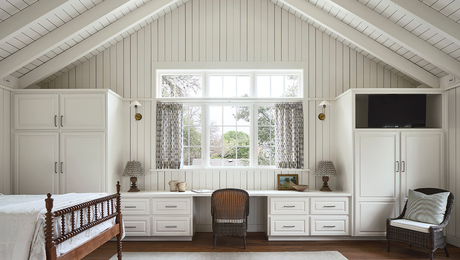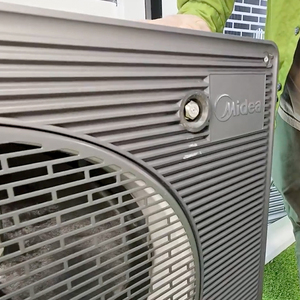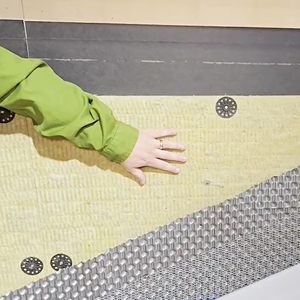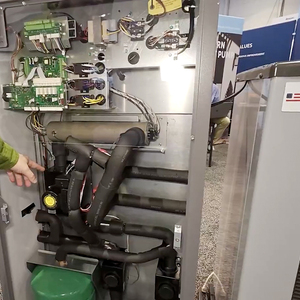Hi all, I need some tool buying advice. I am a single woman, 40’s, homeowner, and I need to drill GOOD holes, therefore I would like to buy a drill. I am new to home repair, but like to do things right and appreciate good tools. I’ve looked at cordless drills, but the really good ones seem to be rather heavy for me. I really don’t mind a corded drill. Anyone out there really crazy about your drill, wouldn’t part with it for the world? Thank you in advance for your advice. Carolyn in Napa
Discussion Forum
Discussion Forum
Up Next
Video Shorts
Featured Story

This 654-sq.-ft. ADU combines vaulted ceilings, reclaimed materials, and efficient design, offering a flexible guest suite and home office above a new garage.
Featured Video
How to Install Cable Rail Around Wood-Post CornersHighlights
"I have learned so much thanks to the searchable articles on the FHB website. I can confidently say that I expect to be a life-long subscriber." - M.K.
Fine Homebuilding Magazine
- Home Group
- Antique Trader
- Arts & Crafts Homes
- Bank Note Reporter
- Cabin Life
- Cuisine at Home
- Fine Gardening
- Fine Woodworking
- Green Building Advisor
- Garden Gate
- Horticulture
- Keep Craft Alive
- Log Home Living
- Military Trader/Vehicles
- Numismatic News
- Numismaster
- Old Cars Weekly
- Old House Journal
- Period Homes
- Popular Woodworking
- Script
- ShopNotes
- Sports Collectors Digest
- Threads
- Timber Home Living
- Traditional Building
- Woodsmith
- World Coin News
- Writer's Digest


















Replies
Carolyn-
It doesn't sound like you will be doing anything like wiring a new house so . . . I would suggest you get a 9.6 volt cordless drill. The 9.6 Makita is light and will last you forever. I do punchwork for a remodeling company and though I frequently get drill-envy, my 9.6 does everything I need it to and has lasted 5 years and runs like the day I got it. Go cordless, you will be happy you did.
Jfish, Thank you for the quick response, and the advice about cordless. I will check out the model you suggested. You're right, I won't be rewiring a whole house, but will be rewiring my garden shed/cottage. But it is small, about 1 1/2 times the size of an average 1970's bathroom. Again, Thanks! Carolyn (p.s. I appreciate the comment about drill envy ... I get that way about chainsaws)
Carolyn, I am a Milwaulkee fan. But, they are expensive for amateurs. One hint might be to go to a local Home Depot, or, if you have one, a Black & Decker clearance store for example. Every big box or tool place has returns they sell cheaper than new, usually with full warrantee.
Good about cordless - they are portable and are MUCH better quality than even 3 years ago.
Bad about cordless - when the batteries die, they cost a fortune.
Although I use my cordless all the time, my much more powerful electric deWalt is much lighter and as long as I have an extension cord, often easier to use.
There is no perfect tool
Aaron
Hi, Carolyn-
I knew what you needed as soon as I read your post and before I read Jfish's- Makita 9.6volt drill/driver, stick-style battery. Almost every carpenter on the planet has had one, been made for at least 20 years, last forever, high quality. Not high power but will likely do everything you want it to. Drill, 2 batteries, charger, and case should cost you about $120. Long live Makita!
Ken Hill
Check out the web sites of the various makers, particularly Makita. Note what other battery tools they make, and what voltages they are. If you're just starting out, you might want to think ahead to the possible purchase of a battery saw. Pick a make and voltage that has a good variety of tools, and if you buy more in the future, you can use all your batteries and chargers with all your cordless tools. You might want to standardize on something with a little more oompf than 9.6 volt. I chose the 12 volt Makita, and now wish I'd gone higher. Unless you're lifting it above shoulder level a lot of the time, don't worry too much about light weight. For the same job, a heavier tool can be easier to control than one that's too light.
-- J.S.
1st you have to ask your self what are you really going to be using it for?. If its just to drill holes then I would go with a corded Makita. If its to drill holes and attach fasteners ( drive screws ect) then I would go with a 9.6 Makita. They make lighter drills like a 7.2 but it wouldnt have the HP to really do you any good. Darkworksite4: When the job is to small for everyone else, Its just about right for me"
Just like all your other cordless devices, the batteries die from old age whether you use them or not; they also lose charge while sitting in the toolbox and may not be ready to go when you are.
The best drill I have is a corded Milwaukee hammer-drill: good balance, drills well, drives screws well, and can punch a hole through concrete when I need to. Surprisingly, it's lighter than the older drills it replaced. Not bad for a drill with a life-time warrantee.
Phill Giles
The Unionville Woodwright
Unionville, Ontario
The DeWalt DW100 corded drill usually goes for about $50-60 at the big box stores. I have abused mine for about 8 yrs, no problems. The difference between this and any worthwhile cordless will buy a lot of extension cords and bits. I recently bought a DeWalt 12v cordless, because I thought it was a good compromise between power, weight, and cost. I'm happy with it. Unless you really have a need for cordless, buy a decent corded model first; they have a lot more power and higher speeds.
The corded DeWalt with the built in levels in a nice drill. Most homeowners are throwing their money away on cordless. Un-used on a regular basis...they die a premature death. The batt's like the constant charge and discharge. If it'll sit more than be used.....go corded.....then it'll last forever. Jeff "That's like hypnotizing chickens........."
I've got a 14.4 DeWalt that I've had for 7 years. It sits most of the time and I still get as much out of the battery as when new. You are correct that these types of batteries like to be cycled, especially if you discharge them way down before recharging. Maybe I got lucky...$ Bill
For a first and single drill, I come down on the the side of a corded 3/8 inch keyless chuck drill. It sounds like you will be around your own home, with a variety of uses for the drill. A 3/8 will mix paint, drill holes big and small, drive screws (therefore the keyless chuck is a must) and will only cost you once. I live and die by my 12 volt Panasonic, but dread the day the battery packs it in (I'm on my second in five years of hard use) but we always have a corded 3/8 on site (Dewalt) for repetitous drilling or power.
Get a supple good quality cord to go with it and you;ll never be sorry.
Get a supple good quality cord to go with it and you;ll never be sorry.
Part of that means the right size like 12 awg groundedbobl Volo Non Voleo Joe's cheat sheet
I'd stay away from cordless, unless you use one a lot. They're expensive, and the batteries won't likely make 5 years.
A good corded drill should last you a lifetime.
I like Milwaukee, but would settle for Dewalt as a homeowner.
Carolyn,
Go to Home Depot, Lowes, or any other store that sells tools and look at their displays. Start picking the drills up, and find the one that feels the most comfortable in your hand, and the lightest and easiest to hold up. Hold the drill straight out, over your head, to your side, etc... Get a feel for the tool, and pick the one that feels the best to you.
Any of the drills that you will be looking at are a good drill for a homeowner to use, and will last a very long time. Just find the most comfortable drill in the price range you are willing to pay.
You may want to try a 1/2" chuck so that you can use a bigger variety of accessories for the drill. The 3/8" chuck is limited to what accessories will fit.
Also, get a 12awg extension cord rated for outdoor use. I like the 25' AND the 50' for use around the house. These two lengths are perfect for a homeowner. It allows a 25' cord for close use, a 50' cord for those times when you need to be a little farther away from an outlet, and together, they make a 75' cord for use outside, far away from an outlet.
Just a thought...James DuHamel
J & M Home Maintenance Service
"Southeast Texas"
So, what did you buy? Inquiring minds want to know!
Actually, each of us is hoping that we gave the best advice, and we're looking for confirmation of our tool knowledge!
Edited 5/13/2002 9:46:38 AM ET by ELCID72
This is to all. Isn't the clutch on the cordless drills a big advantage for driving screws. You can feather the trigger on a corded drill, but if you plan on doing much driving, is a cordless better?
No. The only time I use the clutch is when I'm screwing into plastic, for example. Maybe working on the tail light of the car, replacing the bulb. Then I set the clutch real low so it stops turning before it strips the plastic, then finish by hand. Why can't you feather the speed of your cordless? My 12v Default has infinitely variable speed, and it's not top of the line. My 20 year old Makita two-speed only had on & off in two ranges, but that was early technology.
Part 2 - if you plan on doing much (screw) driving, an electric drill is better. Lighter weight, batteries don't run down, more power, less cost.
Drill good holes? A few things not mentioned otherwise:
More expensive drills have more torque. You may not be
able to handle more torque. As a 200-pound male, the
larger drills will whip me around pretty good. Be careful.
Don't get something with 300+ inch-pounds of torque. It
will break your wrist if catches on something. All the
cordless drills have a clutch. Theoretically this is nice
for driving screws. In 40 years, I have never used the clutch.
I wish they would take the stupid thing out.
You do not need a hammer drill unless you're going to drill
a LOT of large holes in masonry. A masonry bit of moderate
size works just fine in a regular drill.
Much as I hate foreign brands, makita is good stuff. In general,
weight is quality. A light drill will have less battery capacity
and is often cheap homeowner junk. Get a good one and it will
last a lifetime. Makita has a reasonably good cordless set
with a drill and a circ saw for like $200. You will find the
size and versatility of the cordless saw a great convenience.
Stay away from anything under $100. But, don't plan on drilling
many holes over 1/2 or 3/4 inch with a little cordless drill.
Invest in good bits and drills. Don't buy the cheaper import
stuff. It will not drill "good holes". Black$Decker bullet
drills are good. Price indicates quality. If the bits or drills
are $3 for a 50 piece set, plan on drilling one hole and throwing
them away. Do not buy the flat "spade" bits unless you like
being vibrated like a paint mixer, want a sprained wrist and like
oval holes that look like they were chewed out by beavers. For
larger holes, like you need for electrician work, get the bits
with a screw point on the end. Ten times the price, but worth it.
I tend to agree with DuHamel and the thrust of his post.
A few points I will add. Cordless drills are good but rechargeable batteries, especially NiCd, drain themselves in storage. A battery will have a fraction of its original charge remaining after a week of storage. This isn't a problem for tradesmen using it every day but if you plan to only use it occasionally you will likely have to charge the batteries before you can do any work. Forcing the weak batteries to work will drastically shorten the life of the batteries. This is IMHO one of the reason why so many people have such bad lucks with rechargeable systems.
For around $40-60 there are many 3/8" corded drills that are light, handy and surprisingly capable. Being corded they are always ready to go and, assuming you have 120v handy, will still be spinning long after a battery model would be expended. Some time ago I got a small Makita drill. I intended it as a back up for light work like shooting in sheet metal screws and small holes while the larger drill did the heavy work. I really like the clip molded in on the back of the drill. Handy for slipping it on to a jeans pocket or belt while making adjustments.
I was thinking that it would be an expendable back up to keep two people working. It has earned my respect and has become the preferred tool for any light to medium sized job involving ladders or lateral movement where a cord can go. The cord also helps on ladders. Tied to the top it saves the drill if it is dropped.
Corded.
And everything James D. said (post 20157.15).
Rich Beckman
I would never buy a 1/2" drill for all around use. Too heavy to hold a long time, too much torque for driving screws, too slow for smaller drill bits, and can hurt you if it jams. I had a accident with my Milwaukee 1/2 once. Jammed and caused permanent damage to my thumb.
I have a nice little 3/8 older Makita corded drill that is sweet. 6404 2.8 amps 2200 rpm. It doesn't get used much anymore though.
Personally, I wasn't refering to a larger, more powerful drill. I was refering to installing a 1/2" CHUCK onto the lighter weight drill. Still plenty of torque, speed, and ability to use more accessories.
This is why I told her to pick out a LIGHT drill, and hold it in every known position you can think of. THEN add a 1/2" chuck, or even a 1/2" adapter so that you can use some of the other accessories that a homeowner might encounter (like hole saws).
Just a thought...James DuHamel
J & M Home Maintenance Service
"Southeast Texas"
Oh, I see what you meant about the 1/2" chuck. Changing chucks is a pain though. I did it to my first 3/8" drill and kept trying to loosen the screw holding it on untill it broke. Left hand thread - duh. Still have the old craftsman clunker. Big, heavy, noisy, powerless. I was hoping to persuade her to get a professional but smaller drill. The new ones really pack some power, but that can make for excitement sometimes in a jam. Wonder what she bought?
Cancel my previous advice. For infrequent use, the others are right. Go with a cord. Batteries will self-destruct in storage.
-- J.S.
Another thought -- For cordlessness, light duty (holes up to 1/4"), and infrequent use, how about the classic all-mechanical "eggbeater" drill -- the kind where you crank a large bevel gear that turns a small bevel gear. Does anybody have and use one? Can you still get them?
-- J.S.
Hi, John-
Yes, you can still buy those pups. Lee Valley has 'em. They also sell the old time bit braces.
Ken Hill